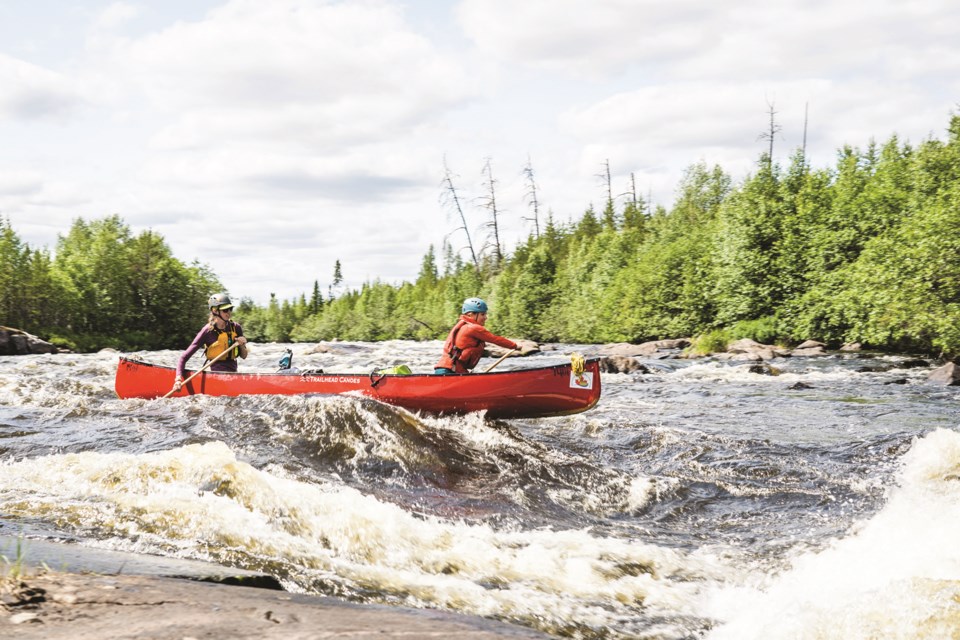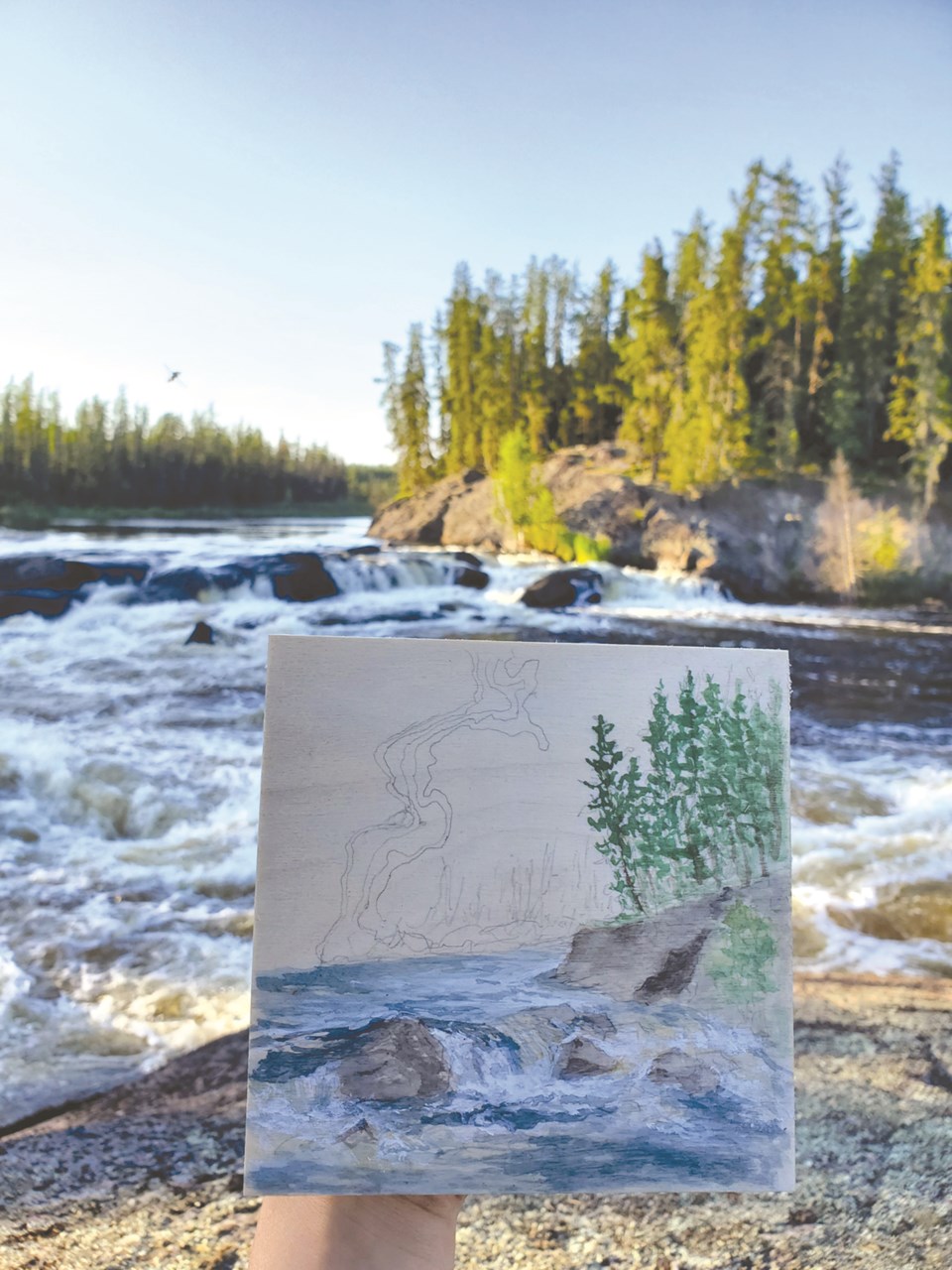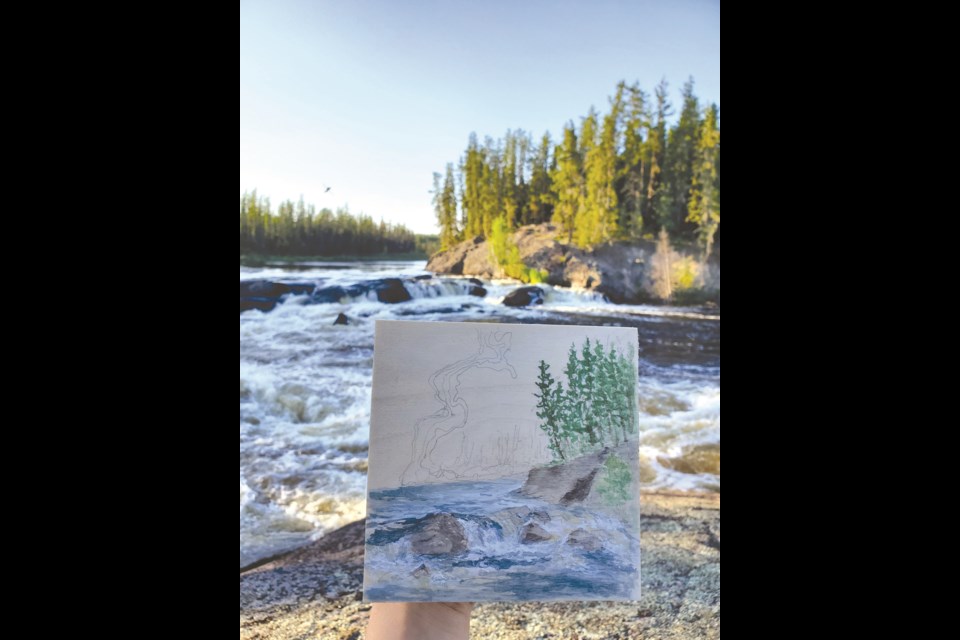OUTLOOK - There isn’t an adventure this girl isn’t willing to take on, whether it’s exploring the Arctic Circle, snowshoeing on frozen lakes, or hiking in remote Canadian locations. But in her latest feat she took on a climbing challenge in a location in northern Saskatchewan very few have even seen, let alone scaled.
Sarah Hicks, daughter of Dale and Leslie Hicks, is at her most content in the outdoors, encountering all that nature has to offer including all types of weather and wildlife, as well as spectacular scenery that captures her artistic eye, be it trees, water, mountains, glacial plains, or arctic tundra. Some of her adventures are ones she has planned and undertaken on her own, while others were part of a program at the University of Alberta Augustana Campus where she recently graduated with her degree in Outdoor Education.
That program included a highly anticipated two-week dogsledding expedition into a remote area of the Northwest Territories. The first week was spent at a homestead where there was opportunity for journaling, fishing, hunting and snowshoeing. Week two the class was out on the trail mushing. “It was so cool to work with a team of dogs for the week and get to know all their unique personalities and how to work with them,” she shared.

Sarah started rock climbing after moving to Kananaskis for work one year ago. Her skills developed quickly thanks to great climbing partners. She says when schedules allow she climbs three to five times per week and that some of the best climbing she’s done was in Bugaboo Provincial Park in B.C. “It’s a beautiful alpine climbing area with amazing granite spires. The routes are really fun and on good quality rock,” she remarked.
So last December when she was invited to do an exploratory climbing and canoe trip in northern Saskatchewan she instantly said yes. A team of seven women was put together that began talking about river choices and working on a grant application with the Alpine Club of Canada. The Jen Higgins Grant supports young women in self-propelled mountain adventures and in March they received the news they’d been awarded the grant.
Many months of planning are required for remote trips such as this. “You need to figure out a lot of logistics such as location, gear, food, flights, and safety plans,” Sarah remarked. “We also had to take into consideration the climbing aspect of our plans so that meant a lot more researching before picking a river to increase our chances of climbing. Luckily, we had a large and enthusiastic group so people were willing to take on the tasks and divvy it up.”
The women were all born and raised in Saskatchewan, and most come from rural backgrounds. Some knew each other from previous canoeing or climbing trips but they all met face-to-face the night before their flight north as they packed the canoe barrels. “We all had varying experience in canoeing and climbing which made for a really well-rounded group,” Sarah explained. “If it was scouting runnable lines in class III rapids or figuring out the best way to set up a climbing route, there was always someone in the group that could do the job with confidence.”
They got to their starting point by float plane in early July and spent nine days on the Foster River exploring the area, looking for good climbing sites and finding camping spots along the shore. The women had done their research but until they were actually there they didn’t know where they might end up climbing. “Even for spots where we knew there were cliffs, we could only be certain if they were climbable or not when we were face-to-face with them,” Sarah explained.
They climbed cliffs at their drop off location and then canoed to see what else they could find. In six long days of paddling they covered 180 kilometers which included 14 portages and 37 sets of rapids, always with eyes on the lookout for hopeful spots to climb.
The greatest physical challenge was a 13-hour day where the team covered 29 kilometers by canoe. It was filled with rapids as well as four portages, the longest and final one being 700 meters which they completed at 9:30 that night. Despite the grueling leg of the trip Sarah said “everyone gave their all until the end of the day.”
It might surprise some people that this province would be a destination for rock climbers but Sarah says that with proper planning, enthusiasts can find great opportunities. “People like to think Saskatchewan is mostly flat prairie when in reality half of it is boreal and Canadian Shield,” she explained. “It definitely takes a lot of research to figure out what areas offer potential for climbing, but it’s there.” But she cautioned it can’t just be about the climb but also about respect for the land and sustainability. “Since we will probably be the only people to ever climb these lines, we didn’t alter the rock with hardware to aid our climbing, just the odd piece of lichen or loose rock was removed whether by accident or for our safety,” she remarked.

For those who might want to see what the province offers for climbers, Sarah offers some advice. “A big thing to take into consideration is that it is remote, exploratory climbing in Saskatchewan, so that means making sure you are a competent canoeist and climber.” That said, for those who have the skills it offers a tremendous experience. “There’s always something to do or dream of,” she enthused, “You just have to have the vision and put in the effort to make it work.”
This expedition helped Sarah grow in confidence in herself and her abilities and she said being part of an all-female team added an important component to the experience. “I’ve never been a part of an all-women expedition before this one but it felt so encouraging and empowering,” she remarked. “We all meshed really well and the team effort to contribute to our common goal was pretty natural and effortless, which was amazing.”




